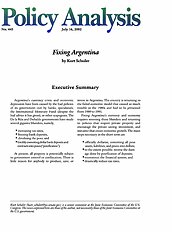Argentina’s currency crisis and economic depression have been caused by the bad policies of its government–not by banks, speculators, the International Monetary Fund (despite the bad advice it has given), or other scapegoats. The De la Rúa and Duhalde governments have made several gigantic blunders, namely,
- increasing tax rates,
- freezing bank deposits,
- devaluing the peso, and
- forcibly converting dollar bank deposits and contracts into pesos (“pesofication”).
At present, all property is potentially subject to government control or confiscation. There is little reason for anybody to produce, save, or invest in Argentina. The country is returning to the failed economic model that caused so much trouble in the 1980s and had to be jettisoned from 1989 to 1991.
Fixing Argentina’s currency and economy requires reversing those blunders and returning to policies that respect private property and encourage the private saving, investment, and initiative that create economic growth. The main steps necessary in the short term are
- officially dollarize, converting all peso assets, liabilities, and prices into dollars;
- to the extent possible, reverse the damage done by pesofication of deposits;
- reconstruct the financial system; and
- drastically reduce tax rates.
About the Author

This work is licensed under a Creative Commons Attribution-NonCommercial-ShareAlike 4.0 International License.
